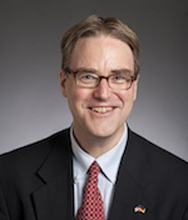Brockmann Explores GDR Literary Culture in New Book

There is no shortage of scholarly studies on the history, politics, and cultural legacy of the German Democratic Republic (GDR), and yet the East German literary scene of the 1940s and 50s “has remained relatively unexamined, particularly among English-language scholars in the last decade or so,” said Stephen Brockmann.
Brockmann, professor of German, has attempted to fill this gap with a new book titled The Writers’ State: Constructing East German Literature, 1945-1959, which was just released by Camden House Publishing.
The book is Brockmann’s fifth to date. Like the others, Writers’ State explores “the relationship between literature and culture on the one hand and German national identity on the other.”
While research into East German literature and culture was once “one of the most vital and exciting parts of German studies,” according to Brockmann, GDR literature from the 1940s and 50s never received much attention. Even when English-language scholars were heavily focused on this theme before the turn of the century, they were mostly looking towards the last three decades of the GDR, studying the works of writers including Christa Wolf, Heiner Müller, and Brigitte Reimann.
“There’s nothing wrong with studying these writers or this generation,” said Brockmann, but doing so has left something of a hole. The years following the GDR’s creation mark a “crucial moment” in the state’s history, said Brockmann. To overlook these years is to overlook an important period of “intense and lively debate” in East Germany, and to lack the context needed to better understand the work of celebrated East German writers associated with other time periods, namely, the 60s, 70s, and 80s.
As for the 1940s and 50s, “It was a fascinating, highly contentious period full of passionate debates, some of which are still highly relevant today,” said Brockmann.
For this reason, Brockmann decided to take a closer look at this important chapter in the GDR’s history.
“The culture of the immediate postwar period in both parts of Germany [East and West] was far richer and more nuanced than has generally been acknowledged,” he said.